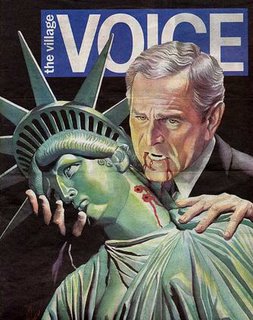See Rossi!!! I TOLD you that was the spooks on the line with us!!!

Spy net may pull in all
U.S. calls overseas
Many Americans' privacy is at risk, some say
Friday, December 23, 2005
By CHARLIE SAVAGE
THE BOSTON GLOBE
WASHINGTON -- The National Security Agency, in carrying out President Bush's order to intercept the international phone calls and e-mails of Americans suspected of links to al-Qaida, has probably been using computers to monitor all other Americans' international communications as well, according to specialists familiar with the workings of the NSA.
The Bush administration formally defended its domestic spying program in a letter to Congress late Thursday, saying the nation's security outweighs privacy concerns of individuals who are monitored.
In a letter to the chairmen of the House and Senate intelligence committees, the Justice Department said President Bush authorized electronic surveillance without first obtaining a warrant in an effort to thwart terrorist acts against the United States.
"There is undeniably an important and legitimate privacy interest at stake with respect to the activities described by the president," wrote Assistant Attorney General William Moschella. "That must be balanced, however, against the government's compelling interest in the security of the nation."
The Bush administration and the NSA have declined to provide details about the program the president authorized in 2001, but specialists said the agency serves as a vast data collection and sorting operation. It captures reams of data from satellites, fiber-optic lines and Internet switching stations and then uses a computer to check for names, numbers and words that have been identified as suspicious.
"The whole idea of the NSA is intercepting huge streams of communications, taking in 2 million pieces of communications an hour," said James Bamford, the author of two books on the NSA, who was the first to reveal the inner workings of the secret agency.
"They have a capacity to listen to every overseas phone call," said Tom Blanton, director of the National Security Archive at George Washington University, which has obtained documents about the NSA's using Freedom of Information Act requests.
The NSA's system of monitoring e-mails and phone calls to check for search terms has been used for decades overseas, where the Constitution's prohibition on unreasonable searches does not apply, declassified records have shown.
But since Bush's order in 2001, Bamford and other specialists said, the same process probably has been used to sort through international messages to and from the United States, though humans have never seen the vast majority of the data.
"The collection of this data by automated means creates new privacy risks," said Marc Rotenberg, executive director of the Electronic Privacy Information Center, a watchdog group that has studied computer-filtered surveillance technology through Freedom of Information Act lawsuits.
Among the risks, he said, is that the spy agency's computers will collect personal information that has no bearing on national security and that intelligence agents programming those computers will be tempted to abuse their power to eavesdrop for personal or political gain.
But even when no personal information intercepted by the NSA's computers make it to human eyes and ears, Rotenberg said, the mere fact that spy computers are monitoring the calls and e-mails may also violate the Fourth Amendment, which protects against unreasonable search and seizures.
The Supreme Court has never ruled on whether automated surveillance of phone calls and e-mails, without a warrant, is constitutional.
The closest comparisons, legal specialists said, are cases challenging the use of dogs and infrared detectors to look for drugs without a warrant. The Supreme Court approved the use of drug-sniffing dogs to examine luggage in an airport, but said police could not use infrared scanners to check houses for heat patterns that could signal an illegal drug operation.
"This is very much a developing field, and a lot of the law is not clear," said Harvard Law School professor Bill Stuntz.
Bush and his aides have declined to answer questions about the spying program, other than to insist that it was legal. Attorney General Alberto Gonzales this week said the program only targeted messages "where we have a reasonable basis to conclude" that one of the parties is affiliated with al-Qaida.
And some legal scholars have maintained that a computer cannot violate other Americans' Fourth Amendment rights simply by sorting through their messages, as long as no human being ever looks at them.
Alane Kochems, a lawyer and a national security analyst at the conservative Heritage Foundation, said, "I don't think your privacy is violated when you have a computer doing it as opposed to a human. It isn't a sentient being. It's a machine running a program."
But Yale Law School professor Jack Balkin said Fourth Amendment privacy rights can still be violated without human contact if the NSA stores copies of everyone's messages, raising the possibility that a human could get access to them later. The administration has not revealed how long the NSA stores messages.
Balkin added that as technology becomes ever more sophisticated, any legal distinction between human agents and their tools is losing meaning.
Under the theory that only human beings can invade people's privacy, he said, the police "could simply use robots to do their dirty work."
In 1978, after revelations that President Nixon had used the NSA to spy on his domestic enemies, Congress enacted a law making it illegal to wiretap a U.S. citizen without permission from a secret national security court. The court requires the government to show evidence that the target is a suspected spy or terrorist.
Under the 1978 law, NSA authorities have had to obtain a warrant from the secret court before putting an American's information into their computers' search terms.
--Dear Homeland Insecurity,,,
If you can read these words ... EAT A DICK.--




0 Comments:
Post a Comment
<< Home